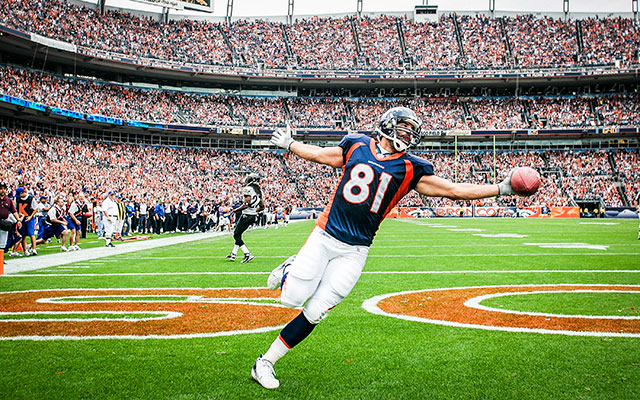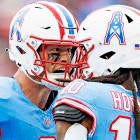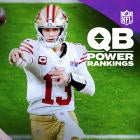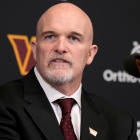
Thirteen months ago, shortly after marijuana had been legalized in Colorado and Washington, NFL commissioner Roger Goodell said there were no plans to change the league's stance on the drug anytime soon.
But former Broncos tight end Nate Jackson thinks that it won't be long before the NFL has to remove marijuana from its list of banned substances. Jackson, who admitted to self-medicating with marijuana during his playing days to avoid a post-NFL addiction to painkillers, says marijuana can help players deal with the physical and psychological pain, including head injuries.
"It kept my brain clean," Jackson said Wednesday, via the Associated Press, during the Cannabis Business Executives Breakfast. "I feel like I exited the game with my mind intact. And I credit that to marijuana in a lot of ways and not getting hooked on these pain pills that are recklessly distributed in the league when a guy gets an injury."
Jackson believes most players use marijuana since they're tested only once a year for street drugs.
"[The NFL is] aware that probably over half of their players smoke weed," he said. "They've been doing it since they were teenagers. The fact that they've been doing it that whole time and still made it to the NFL and are able to satisfy the demands of very, very strict employers on a daily basis means that their marijuana use is in check," Jackson said. "Marijuana is not a problem in their lives."
Jackson's words echo those of former NFL safety Ryan Clark, who said in February 2014: "I know guys on my team who smoke. A lot of it is stress relief. A lot of it is pain and medication. Guys feel like, 'If I can do this, it keeps me away from maybe Vicodin, it keeps me away from pain prescription drugs and things that guys get addicted to.' Guys look at this as a more natural way to heal themselves, to stress relieve and also to medicate themselves for pain. Guys are still going to do it."
Meanwhile, Jackson believes that the NFL is "going to get behind this movement" to de-stigmatize marijuana.
"It's a good public relations move for the NFL to do this because they have a lot of former players who are hurting, who have a lot of cognitive issues, who have orthopedic issues, who have psychological problems and it seems that marijuana helps with all of these things," Jackson said. "So, the NFL has taken some PR hits in the last year over a few things, and I think they'll be eager to get behind something like this."
Back in January 2014, Goodell was unequivocal about marijuana remaining a banned substance.
"This has been something that has been asked several times and I'll try to be as clear as I possibly can: It is still an illegal substance on a national basis," Goodell said at the time. "It's something that's part of our collective bargaining agreement with our players. It's questionable with respect to the positive impact but there is certainly some very strong evidence to the negative impacts, including addiction and other issues."
The league reiterated that stance this week. "At this time, the medical advisers to our drug program tell us that there is no need for medical marijuana to be prescribed to an NFL player," NFL spokesman Greg Aiello told the AP.
The league hasn't shut the door forever on the topic, however. "If the science shows it and there is a rigorous process in place to determine that the only drug that could help is medical marijuana, then we would consider allowing it in necessary cases."
For now, though, it remains illegal in the eyes of the NFL.





















